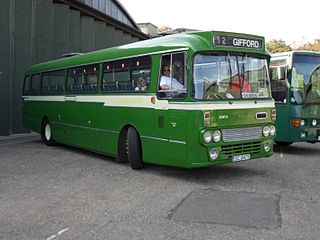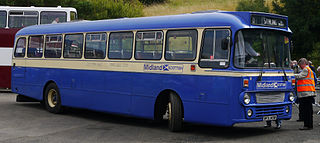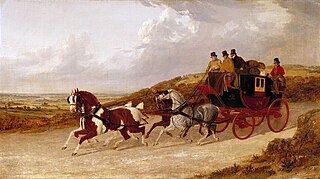
H. J. Mulliner & Co. was a well-known British coachbuilder operating from Bedford Park, Chiswick, West London. The company which owned it was formed by H J Mulliner in 1897 but the business was a continuing branch of a family business founded in Northampton in the 1760s to hire out carriages. In December 1909 the controlling interest in this company passed to John Croall & Sons of Edinburgh. Croall sold that interest to Rolls-Royce in 1959.

Major Charles Henry John Chetwynd-Talbot, 20th Earl of Shrewsbury, 20th Earl of Waterford, 5th Earl Talbot, KCVO, styled Viscount Ingestre from 1868 to 1877, was a British peer. Unusually for a wealthy nobleman of the period, he began several businesses connected with road transport, with mixed success.

Eastern Scottish Omnibuses Ltd. was a bus and coach operator based in Edinburgh, Scotland and a subsidiary of the Scottish Bus Group. Eastern Scottish was formed in June 1985 from the main part of Scottish Omnibuses Ltd., which had itself traded as 'Eastern Scottish' since the 1960s. Following privatisation in 1990 the company traded as 'SMT' reviving the original name of the company. It operated until 1994, when it became part of GRT Bus Group plc.
Lowland Scottish Omnibuses Ltd was a bus operator in south eastern Scotland and parts of Northern England. The company was formed in 1985 and operated under the identities Lowland Scottish, Lowland and First Lowland / First SMT, until 1999 when the company's operations were combined with the operations of Midland Bluebird in a new company, First Edinburgh Ltd. As of 26 March 2017 these operations were transferred to West Coast Motors.

Midland Scottish Omnibuses Ltd was a bus operator formed in June 1985 as a subsidiary of the Scottish Bus Group, created from part of W. Alexander & Sons (Midland) Ltd. The company operated as Midland Scottish until 1991, when it was renamed Midland Bluebird in preparation for privatisation.

The Class 67 locomotives are a class of Bo-Bo diesel-electric locomotives that were built for the English Welsh & Scottish Railway (EWS) between 1999 and 2000 by Alstom at Meinfesa in Valencia, Spain with drive components from General Motors' Electro-Motive Division.
Walter Alexander Coachbuilders was a Scottish builder of bus and coach bodywork based in Falkirk. The company was formed in 1947 to continue the coachbuilding activities of W. Alexander & Sons when their bus service operation was nationalised. After several mergers and changes of ownership it now forms part of Alexander Dennis.

Xplore Dundee is a bus operator based in Dundee, Scotland, operating services mainly within the city. The operator also runs a service to Edinburgh Airport. It is a subsidiary of McGill's Bus Services.

Caledonian Sleeper is the collective name for overnight sleeper train services between London and Scotland, in the United Kingdom. It is one of only two currently operating sleeper services on the railway in the United Kingdom – the other being the Night Riviera, which runs between London and Penzance.

Thrupp & Maberly was a British coachbuilding business based in the West End of London, England. Coach-makers to Queen Victoria they operated for more than two centuries until 1967 when they closed while in the ownership of Rootes Group.

A mail coach is a stagecoach that is used to deliver mail. In Great Britain, Ireland, and Australia, they were built to a General Post Office-approved design operated by an independent contractor to carry long-distance mail for the Post Office. Mail was held in a box at the rear where the only Royal Mail employee, an armed guard, stood. Passengers were taken at a premium fare. There was seating for four passengers inside and more outside with the driver. The guard's seat could not be shared. This distribution system began in Britain in 1784. In Ireland the same service began in 1789, and in Australia it began in 1828.

Kelso Racecourse is a thoroughbred horse racing venue located in Kelso, Scotland. It is frequently described as "Britain's Friendliest Racecourse". It was voted the Best Small Course in Scotland and the North of England in 2007, 2012 and 2014 by the Racegoers Club. In addition to staging Scotland's most valuable hurdle race, the Morebattle Hurdle, Kelso stages a comparatively high number of Class 1, 2 & 3 races over jumps.
Scottish Motor Traction (SMT) was a Scottish bus operator founded in 1905 that ran services for most of the 20th century.

The Tilling Group was one of two conglomerates that controlled almost all of the major bus operators in the United Kingdom between World Wars I and II and until nationalisation in 1948.

West Coast Motors is a bus, coach and ferry operator, based in Campbeltown, Scotland. The company also operates under the name Borders Buses in the Scottish Borders and formerly under the Glasgow Citybus brand in Greater Glasgow.
Birch Brothers was a bus and coach operator in south east England.
H. V. Burlingham was a British coachbuilding business based in Blackpool, Lancashire from 1928 until 1960 when they were taken over by London-based rivals Duple Motor Bodies. Duple initially renamed Burlingham as Duple (Northern) but in 1969 they closed their Hendon factory and concentrated production in Blackpool. Duple coach bodies were built in the former Burlingham premises until Duple itself was liquidated in 1989.

Arthur Mulliner was the 20th century name of a coachbuilding business founded in Northampton in 1760 which remained in family ownership. The business was acquired by Henlys Limited in 1940 and lost its separate identity.

Duncan & Fraser Limited was a vehicle manufacturing company founded in 1865 in Adelaide, South Australia that built horse-drawn carriages and horse trams, and subsequently bodies for trains, electric trams and motor cars, becoming one of the largest carriage building companies in Australia.

Borders Buses is a local and regional bus operator based in Berwick-upon-Tweed, England. It operates services in Edinburgh, East Lothian, Midlothian and Scottish Borders in Scotland, as well as Cumbria and Northumberland in England. It is a subsidiary of West Coast Motors.



















